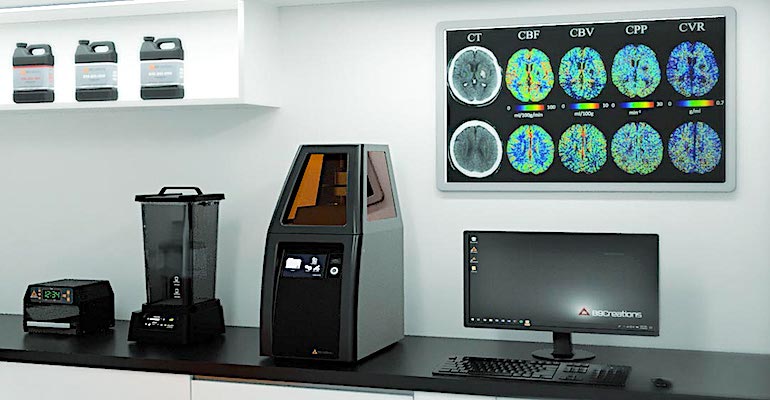3D Printing and the Future of Agile, Personalized Healthcare
3D, along with AI, machine learning, and digital security, will be key technologies in the coming decade.

Advances in 3D printing technology are being implemented across the globe. When it comes to the healthcare system, the emergent technology is changing how providers treat patients and is a driving force behind personalized care, fueling a new era wherein the advanced technology plays a central role within the medical field. Not only can patients undergo surgery with a 3D printed implant created precisely for them, we are also nearing the delivery of 3D printed customized drug tablets and are leveraging 3D printers to address the ongoing global health crisis.
In the battle against COVID-19, 3D printer companies specializing in a range of services pivoted their technology and designs to support relief efforts, mass-producing medical products essential for providers in pandemic. One of the more disruptive and transformative companies helping with the production of equipment sorely in need is B9Creations. The 3D printing solutions provider played an integral role in producing shells for ventilator masks and nasal swabs, among other in-demand products.
I spoke with Dani Mason, VP of marketing and communications at B9Creations. The company exhibited at Informa Markets – Engineering’s industry-leading MD&M | BIOMEDigital, a new virtual conference and exhibition for medical device engineers and manufacturers driving progress and innovation in medtech and biotechnology.
As an industry leader in additive manufacturing, your cutting-edge 3D printing technology has greatly supported the medical community amid-pandemic. Can you speak to how B9Creations responded to the need for PPE and other medical-related products?
Mason: Amid the pandemic, B9Creations, a global manufacturer of 3D printers, launched a COVID-19 response initiative to produce masks for non-medical essential workers at companies nationwide, offer 3D printing and logistics services for businesses experiencing supply chain or labor disruption, and create an online global network connecting businesses in need with partners who can help.
We responded to the need for PPE by partnering with telecommunications companies to 3D print reusable protective masks for their essential personnel. B9Creations also partnered with healthcare providers to additively manufacture nasal swabs to help with the nationwide shortage.
During the pandemic, B9Creations opened up a new service bureau arm to offer on-demand 3D printing services to businesses whose current additive manufacturing or injection molding services had been shut down or who could not access their 3D printers because of isolation measures requiring they work from home. We also provide logistics and shipping for impacted companies.
Additionally, B9Creations created an online network where businesses and individuals with excess capacity, time, and talent can help others with various services, from design to production.
How has the pandemic impacted the 3DP industry, and what resulting changes will we see in the future?
Mason: Global events, like the pandemic, accelerate trends. Thus, far from being a 2020 anomaly, supply chain resiliency, onshoring manufacturing, and just-in-time production for products in critical industries will continue to grow in importance in 2021—as will the role additive manufacturing plays in the solution.
SME Media surveyed more than 700 manufacturing professionals across industries ranging from aerospace to defense, industrial, medical, and more to understand what investments companies plan to make post-pandemic. Additive manufacturing was one of the top four investments in every industry surveyed and one of the top two in 55 percent of sectors surveyed. That’s a clear indicator that a key trend in our industry will be customers shifting demand from industry-agnostic 3D printers to industry-tailored additive production platforms. At B9Creations, we believe in that trend so strongly that we’ve launched an entire division, B9[X], where X is the variable the customer defines. This division focuses solely on meeting industry- and customer-specific needs with custom solutions, from hardware, software, and materials to services and Lean, regulatory, and additive manufacturing expertise.
In addition to additive manufacturing, AI and machine learning and digital security will be key emerging technologies for the coming decade.
2020 has shown how critical it is for companies, government, healthcare, educational institutions, and even individuals to continually adapt and make decisions based on complex information changing in real-time. This nearly limitless quantity of available data and interconnectivity between people and devices and device-to-device necessitates robust AI models that can analyze large sets of complex data to enable organizations to identify profitable opportunities potential risks quickly.
AI and machine learning will also be critical in cementing additive manufacturing as a production tool with equal capability and credibility to other production methods (molding, milling, etc.). However, as both AI and AM technology matures and companies transfer digital files to print locally, digital security will also be paramount.
About the Author(s)
You May Also Like





